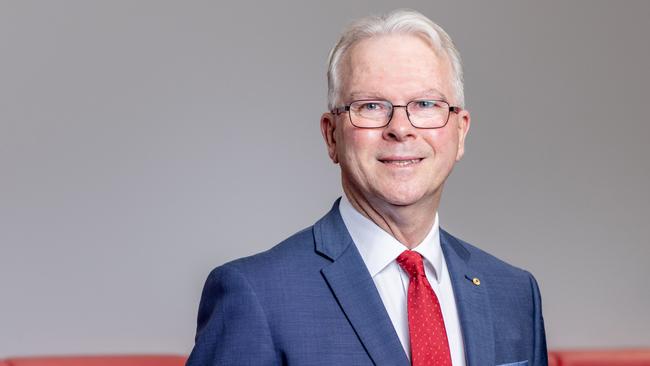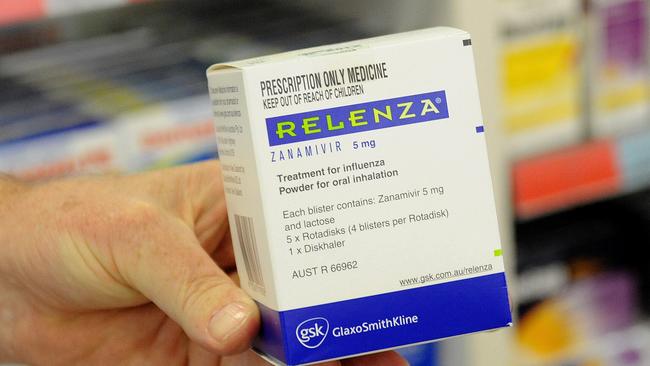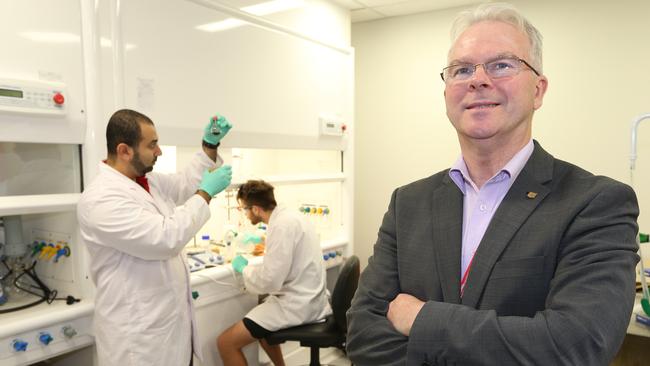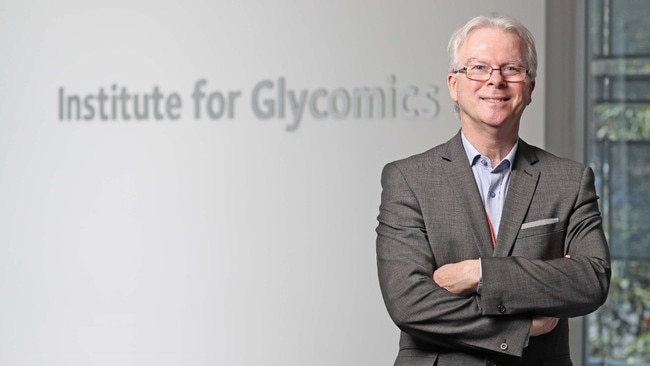Renowned Gold Coast scientist Professor Mark von Itzstein eyes pandemic ‘magic pill’
Mark von Itzstein changed the world with the first anti-flu drug, now he’s desperate to get into the lab before the next pandemic, warning ‘we are not prepared’.
News
Don't miss out on the headlines from News. Followed categories will be added to My News.
The Gold Coast’s own world-leading scientist, citizen of the year and Officer of the Order of Australia is officially stepping down from the ground-breaking institute he founded.
But don’t be mistaken.
Just because Professor Mark von Itzstein is retiring his title as director of Griffith University’s Institute for Glycomics, does not for a moment mean he is retiring from research.
Given his discoveries led to the world’s first anti-influenza drug, Relenza, now stockpiled by governments around the world, it’s perhaps more important than ever that Mark gets back to the lab.

And no one knows that better than Mark himself, who once appeared on the cover of Time Magazine for his breakthrough findings.
Because while we all hope that the worst of the pandemic is behind us, Mark knows what comes next may well be far worse … and sooner than we think.
“Infectious diseases are the biggest threat to mankind,” says Mark.
“It might seem strange to say but we got off fairly lightly with Covid, it could have been far far worse in terms of loss of life.
“Of course, we suffered badly in terms of the economic and socio-economic impact, particularly with regards to lockdowns and loss of business and jobs, but the death toll, although significant, could have been so much more.
“When a flu pandemic really comes a buster it can kill 50 million-plus. If we’re smart, we need to view the Covid pandemic as our warning … we are not prepared.
“That’s why I want to get back on the tools, I want to focus on the science and research rather than admin of being a director, as much as I loved it.
“I’ll be working on what will be the next big unknown, discovering new drugs - especially anti-microbials for both bacterial and viral infections - that the world will need.
“We have already developed a portfolio of projects that look at targeting multiple organisms that these infections have in common. The idea is to create a ‘magic pill’ of sorts that would attack present and future bacterial and viral infections. Even those that don’t yet exist.”

Mark says he decided to step down as director of the Institute after being awarded the National Health and Medical Research Council (NHMRC) Investigator fellowship, which he says places him in the fortunate position to actually have the funding to keep searching for the next cure for the next disease.
Because what disturbs Mark almost as much as what virus or bacteria may come next for humanity, is that the scientists - the only defence against any pandemic - are chronically under-funded.
“It’s quite unbelievable that, even after the pandemic, governments are still not doing enough,” he says.
“The NHMRC offers an Ideas Grant to support innovative research, but only 10 per cent of applicants received funding, it used to be 25 per cent. That means right now 90 per cent of scientists are missing out. Now, not at all of them would be deserving, but a great deal are.
“As a result, we are losing great people from science and STEM because the government is not doing enough. If we lose the people in this pipeline, the entire industry will crumble - and that will be devastating for the entire population.
“We’ve actually gone backwards in funding for science, even after the pandemic.
“I was in Boston recently and I saw Kevin Rudd, who is now the Australian Ambassador to the US, and I told him if we don’t increase basic clinical funding substantially and soon, the industry will die.
“He did listen and his response did give me some hope that we might have some joy. We are very under-funded compared to other developed countries, and that is a danger to us all.”

That concern is why Mark believes it is his responsibility to use the funding he has as aggressively and urgently as he can. And that means no more administrative tasks.
Besides, after 23 years leading the Institute he founded - and defying every critic who questioned his move to the Gold Coast - he knows his ‘baby’ is all grown up and ready for the next stage of its life.
And while the Institute has been the focus of Mark’s work, it wasn’t always meant to be this way.
Born and bred on a 200-acre farm near the Archerfield aerodrome, Mark was convinced he was destined for life as a veterinarian.
But upon completion of his Bachelors of Science at Griffith University, he decided his path was strictly science.
Completing his PhD in chemistry, he headed off to Germany after winning a major fellowship, but a flurry of job offers back in Australia saw him accept a position in Melbourne.
And then Griffith Vice Chancellor Professor Roy Webb called, asking what it would take to bring Mark back to Queensland.
The answer was the Institute for Glycomics.

Glycomics itself is the study of carbohydrates or sugars, especially their involvement in disease, and the Institute is one of the largest of its kind in the world and the only one in Australia.
From a handful of staff to more than 200 staff and students, the Institute has become a globally recognised centre for innovation, attracting top-tier talent, securing substantial funding and producing ground-breaking discoveries with transformative implications for human health.
“After 23 years as director, there is that realisation that you probably have achieved as much as you can. It will be great to see new leadership that hopefully will take the Institute to a new level,” he says.
“Over just two decades we have created a unique translational research institute, that now has a rich research pipeline, a drug accessible under the special access scheme to treat viral-induced arthritis and another drug and two vaccine candidates continuing in human clinical trials. That’s a remarkable achievement.
“When I decided to come here in 2000, people thought I was insane. They laughed at me and said ‘why the Gold Coast’? But why not the Gold Coast?
“That was always my thinking. This was virgin territory in terms of a research institute, yet hot property in terms of where people want to live. I’ve said it before, it reminded me of San Diego … the combination of beautiful geography and fantastic research opportunity.
“When I look at it now, it has just surpassed any expectation or hope I ever had.
“I never could have predicted 23 years ago that we would have the Health and Knowledge Precinct, two hospitals, the university and so many industry players all right here. That’s just been a beautiful thing to see.
“The opportunities we have here are why there is no other major precinct in the country that can match the powerhouse we provide.”

With Mark turning his focus back to the lab, it may not be too long before the Institute and Griffith University are making headlines again.
From a vaccine for melanoma to new antivirals that will fight respiratory illness, still the most likely suspect for the next pandemic, Mark says there area number of breakthrough prospects in the pipeline.
“We have a number of programs running and are beavering away to get great outcomes, one of them being a very strong interest in melanomas,” he says.
“We also have new antivirals from a group we hope will progress to human clinical trials in 2024 that will work on respiratory diseases, that is what we have to be focused on.
“The world must be very alert to the fact that respiratory pathogens are highly likely to be pandemic culprits. We’ve already seen the flu and Covid as examples, but the next could be something as simple as rhinovirus, which is the cause of the common cold. What happens if it begins to morph and becomes very aggressive?
“No one knows what it will be, but understanding how respiratory pathogens operate and being able to find a common process or common protein that we can target gives us an opportunity to make drugs and vaccines in advance, before the next pandemic begins.”
Mark says while the pandemic lead to a number of scientific achievements, it’s also been incredibly hard on those in the industry.
He says disinformation and misinformation have been difficult adversaries, but the unequivocal fact was that vaccines had saved an incredible number of lives.
“Those Covid vaccines, as rapidly as they appeared for the first time in humanity, saved an enormous number of lives,” he says.
“It is true that vaccines, like anything, carry some risk. Just as leaving your house, or even staying in your house. Everything in life carries risk.
“But when you weigh the risk, it remains far safer to have the vaccine than to have Covid without it.
“The low, low, low - less than one per cent - experience of adverse events from the vaccine is insignificant compared to the lives it saved.”

Regardless of public perception in terms of science, Mark says he is incapable of doing anything but dedicating his life to trying to save others.
In recognition of his contributions to research and to Griffith, the University has bestowed on Mark the title of Distinguished Professor.
He will also continue his leadership of the Griffith-based Australian node of the Fraunhofer International Consortium of Anti-infectives Research, a significant joint initiative between the Institute for Glycomics and the Fraunhofer Institute for Toxicology and Experimental Medicine in Hannover, Germany.
And not to forget that the Gold Coast already has a road named in his honour … Von Itzstein Street, appropriately connected to Knowledge Street.
For Mark, it’s another indicator that this is his forever home.
“I’m frequently travelling, but I’ll always live on the Gold Coast. Why would I ever leave such a beautiful place?”
Truly Professor, the honour is all ours.





